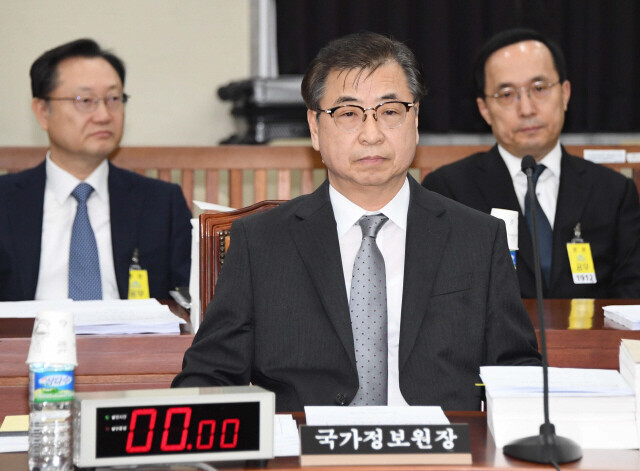hankyoreh
Links to other country sites 다른 나라 사이트 링크
Pompeo’s NK visit cancelled because of demands for immediate end-of-war declaration, NIS says

US Secretary of State Mike Pompeo’s abrupt cancellation of a fourth North Korea visit in late August appeared to be the result of a conflict between North Korea’s demand for a declaration ending the Korean War ahead of anything else and the US’s insistence that denuclearization come first, the National Intelligence Service (NIS) suggested.
During an appearance before a plenary session of the National Assembly Intelligence Committee on Aug. 28, NIS Director Suh Hoon was reported as saying the service had “determined that [Pompeo] is unable to go [to North Korea] before the clash between North Korea, which is demanding the adoption of a war-ending declaration, and the US, which is calling for a denuclearization declaration first.”
In a press briefing after the session that day, Kim Min-ki, the Democratic Party’s ranking member on the committee, reported Suh as giving the response when asked by lawmakers why Pompeo had reversed his decision a day after the fourth North Korea visit was announced. US President Donald Trump cancelled Pompeo’s planned North Korea visit on Aug. 24, citing insufficient progress on North Korea’s denuclearization.
Lee Eun-jae, the Liberty Korea Party’s ranking member for the committee, also took part in the press briefing.
“The US is asking [North Korea] to present a denuclearization list first, and North Korea wants to have a war-ending declaration first,” she said.
During the Q&A session, opposition party lawmakers asked several questions on whether Washington’s displeasure with what it views as trilateral coordination by Beijing, Pyongyang, and Seoul might have been a factor in the cancellation of Pompeo’s visit, which Suh “neither confirmed nor denied,” Lee added.
In terms of denuclearization goals for the Korean Peninsula, the ruling and opposition party ranking members reported Suh as saying, “If there are 100 North Korean nukes, that means disposing of all 100.” When asked by a lawmaker if the “primary target” would be 60 percent, Suh answered “yes,” they added.
When asked by opposition lawmakers if supplies of petroleum and electricity to an inter-Korean joint liaison office to be established in Kaesong would be in violation of North Korea sanctions, Suh was quoted as replying, “Establishing an inter-Korean office means having in-depth contact on a permanent basis and will be helpful in communication on denuclearization.”
“Our determination is that it does not fall under the category of areas [affected by] North Korea sanctions,” he was reported as saying.
By Jung Yu-gyun, staff reporter
Please direct comments or questions to [english@hani.co.kr]

Editorial・opinion
![[Column] Season 2 of special prosecutor probe may be coming to Korea soon [Column] Season 2 of special prosecutor probe may be coming to Korea soon](https://flexible.img.hani.co.kr/flexible/normal/500/300/imgdb/original/2024/0426/3317141030699447.jpg) [Column] Season 2 of special prosecutor probe may be coming to Korea soon
[Column] Season 2 of special prosecutor probe may be coming to Korea soon![[Column] Park Geun-hye déjà vu in Yoon Suk-yeol [Column] Park Geun-hye déjà vu in Yoon Suk-yeol](https://flexible.img.hani.co.kr/flexible/normal/500/300/imgdb/original/2024/0424/651713945113788.jpg) [Column] Park Geun-hye déjà vu in Yoon Suk-yeol
[Column] Park Geun-hye déjà vu in Yoon Suk-yeol- [Editorial] New weight of N. Korea’s nuclear threats makes dialogue all the more urgent
- [Guest essay] The real reason Korea’s new right wants to dub Rhee a founding father
- [Column] ‘Choson’: Is it time we start referring to N. Korea in its own terms?
- [Editorial] Japan’s rewriting of history with Korea has gone too far
- [Column] The president’s questionable capacity for dialogue
- [Column] Are chaebol firms just pizza pies for families to divvy up as they please?
- [Column] Has Korea, too, crossed the Rubicon on China?
- [Correspondent’s column] In Japan’s alliance with US, echoes of its past alliances with UK
Most viewed articles
- 1[Column] Season 2 of special prosecutor probe may be coming to Korea soon
- 2‘We must say no’: Seoul defense chief on Korean, USFK involvement in hypothetical Taiwan crisis
- 3No good, very bad game for Korea puts it out of Olympics for first time since 1988
- 4Division commander ordered troops to enter raging flood waters before Marine died, survivor says
- 5Is Japan about to snatch control of Line messenger from Korea’s Naver?
- 6Korea’s 1.3% growth in Q1 signals ‘textbook’ return to growth, says government
- 7Is N. Korea threatening to test nukes in response to possible new US-led sanctions body?
- 8[Editorial] Korea’s surprise Q1 growth requires objective assessment, not blind fanfare
- 9[Editorial] New weight of N. Korea’s nuclear threats makes dialogue all the more urgent
- 10‘Weddingflation’ breaks the bank for Korean couples-to-be